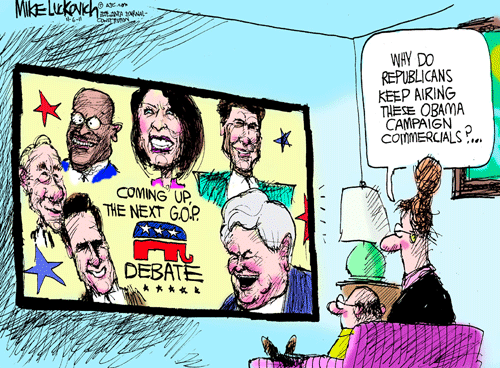
The GOP’s corporate allies have set a New Year’s resolution they hope will lead to electoral victory in the 2014 midterms: “No fools on our ticket.”
Republican House leaders are planning to impose discipline on unruly members to help avert the party squabbles that badly damaged the GOP brand, and major donors and advocacy groups such as the U.S. Chamber of Commerce and American Crossroads intend to develop and fund more centrist candidates.
“Our No. 1 focus is to make sure, when it comes to the Senate, that we have no loser candidates,” said Scott Reed, the top political strategist for the U.S. Chamber of Commerce, told the Wall Street Journal. “That will be our mantra: No fools on our ticket.”

Presumably, Reed’s talking about candidates such as Mark Jacobs, Bob Vander Plaats,Chris McDaniel and David Barton.
Party leaders also plan to promote legislation, such as child tax credits and flextime for hourly workers, in hopes of appealing to working families.
“Working middle-class families are struggling to find a good-paying job, get ahead and keep more money in their pocket,” said Republican House Majority Leader Eric Cantor. “House Republicans will continue to offer conservative solutions that help create better conditions for them to succeed.”
Republican House Speaker John Boehner signaled this shift earlier this month when he chided conservative activist groups that opposed the two-year budget compromise.
The Speaker’s deputies also worked behind the scenes to quiet internal dissent by warning committee chairmen that opposition to the deal could jeopardize their committee posts.
“The Speaker, and the entire leadership team, urged all House Republicans to support the [budget] agreement, which lowered the deficit without raising taxes,” said Boehner’s spokesman, Michael Steel.
Committee chairmen had helped derail a farm bill earlier this year and extended the federal government shutdown.
Party leaders will test their clout next month when Congress considers a bill to keep the federal government running and later in the spring when lawmakers consider whether to extend the debt ceiling.
The debt-ceiling debate will take place as Republican primaries start in early March, and the party’s business wing intends to advocate against Tea Party candidates.
The Chamber of Commerce plans to spend at least $50 million to promote business-friendly candidates who they think can win a Republican Senate majority, and they hope the GOP House might pass a farm bill and reform the immigration system.
But conservative activists groups say that won’t happen.
“Lawmakers do not have a monopoly on information, and we will continue to communicate directly with their constituents on important legislation as it moves through Congress,” said Michael Needham, chief executive of Heritage Action, part of the Heritage Foundation think tank. “(Lawmakers) will find it difficult to go back home and defend votes that increase spending, increase deficits and undermine the rule of law.”